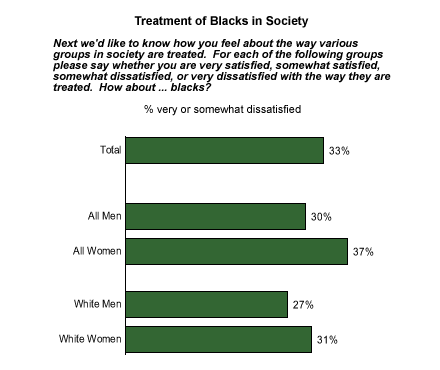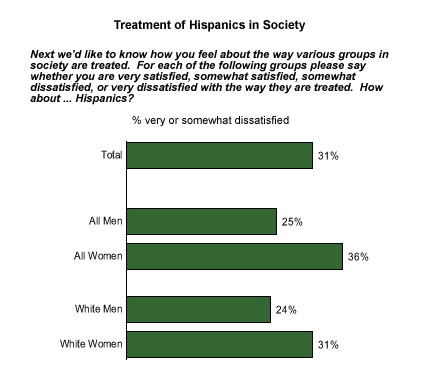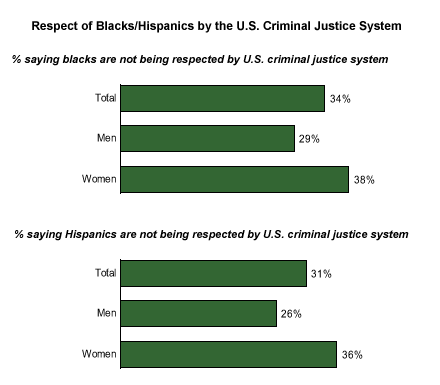According to a June 2002 ���۴�ýPoll*, about a third of Americans are dissatisfied with the way that society treats blacks (33% of Americans are very or somewhat dissatisfied) and Hispanics (31% of Americans are very or somewhat dissatisfied). Underneath those overall numbers, however, lies a substantial gender gap: women are significantly more likely than men to say there is discrimination against blacks and Hispanics.
More Dissatisfaction With Treatment
When looking at the population overall, 37% of women say they are very or somewhat dissatisfied with how blacks are treated, compared to only 30% of men. The gap persists, although it becomes smaller, when the focus is narrowed to the views of non-Hispanic white women versus non-Hispanic white men: 31% of non-Hispanic white women are dissatisfied with the treatment of blacks compared to 27% of non-Hispanic white men who share this view.
The gender gap is more notable with regard to views on the treatment of Hispanics. Among the total population, 36% of women are dissatisfied with the treatment of Hispanics, versus only 25% of men who are dissatisfied. Among non-Hispanic whites, 31% of women are dissatisfied with the treatment of Hispanics as compared to 24% of men.


Women More Likely to Say Civil Rights of Groups Not Respected
Women are also more likely than men to say that the U.S. criminal justice system is not respecting the civil rights of blacks and Hispanics. Thirty-eight percent of women say that the civil rights of blacks are not being respected, while only 29% of men feel the same.
A similar divide exists between men and women with reference to Hispanics: 36% of women and only 26% of men say that the civil rights of Hispanics are not being respected by the U.S. criminal justice system.

Why the Differences?
Examining political ideology and party identification may yield some insight on why these differences exist. On a basic level, we know that men are more likely than women to consider themselves conservative -- 41% of men versus 33% of women say they are very conservative or conservative, according to an August 2002** Gallup survey. That same survey shows that women are also more likely than men to identify themselves as Democrats -- 42% of women say they are Democrats compared to 28% of men who say so, while 29% of women and 37% of men say they are Republicans.
At some level, these ideological and partisan differences pose a chicken-and-egg question with regard to differing perceptions of race relations. Women may tend to develop more liberal perspectives because they are more likely to identify with the problems associated with discrimination. Conversely, it may be that the tendency to identify with a liberal platform in the first place makes women more aware of minority issues.
Support for the former explanation may be found in the fact that three in five women (60%) still say that women do not have equal job opportunities to men, compared to 45% of men who say that women do not have equal job opportunities (see "Job Equality Views: Gender Gap Still Wide" in Related Items). And many women (41%) also say that they, themselves, frequently face gender discrimination in public life and at their jobs. That personal experience may make women more likely than men to notice unfair treatment toward racial or ethnic groups.
*Results are based on telephone interviews with 1,360 national adults, aged 18 and older, conducted June 3-9, 2002, including oversamples of blacks and Hispanics that are weighted to reflect their proportions in the general population. For results based on the total sample of national adults, one can say with 95% confidence that the maximum margin of sampling error is ±3%.
**Results are based on telephone interviews with 1,007 national adults, aged 18 and older, conducted Aug. 5-8, 2002. For results based on the total sample of national adults, one can say with 95% confidence that the maximum margin of sampling error is ±3%.
